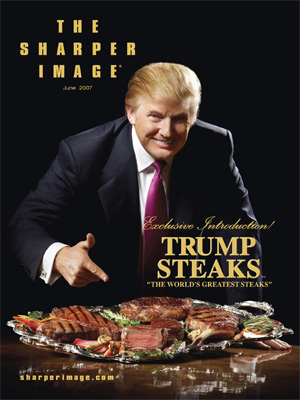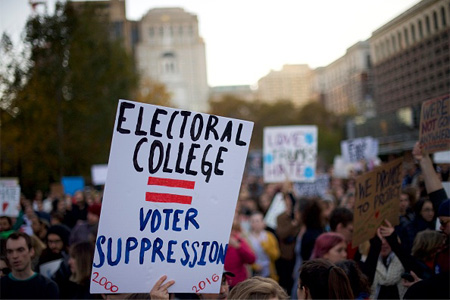The Electoral College's Rules Are More Dated Than We Thought

Every four years, we do something incredible in the United States: We select our next president based not on the interests of the powerful elite, but on the opinions of common people. Even if those people have no political connections, lobbyist money, or real understanding of how the electoral process works.
Our presidential election, like any system designed to aggregate the voices of 300 million people, has its quirks. We don't actually directly elect the president; we vote for representatives to the Electoral College, who then in turn choose the president. That system has a couple of weird consequences that, for some reason, seem to be suddenly super important after electing former steak entrepreneur Donald J. Trump.

With Hillary Clinton winning the popular vote but losing the Electoral College, some are questioning whether it still makes sense to use a system designed to give more weight to less-populous states. And then we have the possibility of Russia influencing the election in Donald Trump's favor. That's leading some to wonder how the Electoral College should weigh their pledge to vote for Trump against the potential duty to prevent an unwitting Manchurian candidate. If their conscience differs from the popular decision, how should they vote?
That question was clearer 238 years ago, when the Electoral College was clearly meant to serve in part as a bulwark against uninformed voters who didn't have access to all the facts, or did have access to way, way too many thinkpieces on the facts. Our country has changed significantly since the creation of the Electoral College (we now have spaceflight), but in a lot of ways, it hasn't (we're still none too sure about this whole "science" thing). So is it a useful check built in for good reasons, or is it an antiquated and insane system that is a stain on our national honor, like the Nielsen ratings system? We thought it important to discuss the lesser-known details of how the Electoral College actually works, so you can decide for yourself.
Selection
First, the winning party in each state selects their "electors." The Constitution mandates that electors be above the age of 18 and above the social standing of the Irish. The first provision is to ensure that electors have the life experience to make a sound decision, and the second is to prevent what's called an "Irish vote," in which too many Irishmen vote in the election and we have to do the whole thing over again.
Voting Day
While Election Day in early November, the electors cast theirs on the first Monday after the second Wednesday in December, which is officially called "Real Election Day (Not The One For Those Chumps)." The delay between our voting and the selection of the president is meant to give electors time to ride on mooseback to their state's capital for the beginning of the voting process.

Arrival
Upon arriving at their state's capital, each of the 538 electors gives his or her (but let's be honest, his) secret passphrase to the Secret Service agent they meet there because they refused to meet them at their house. All of the secret passphrases are always "Tallywag."
They are then escorted to a curtained-off booth that contains a ballot with each candidate's name on it. Once they have had a chance to verify the names, a trapdoor opens in the booth that whisks them off to the secret room behind Mt. Rushmore. For electors from Alaska and Hawaii, this is a long journey, so it's advisable to bring a book. Also they might die.
Cleansing
Once at Mt. Rushmore, all electors are cleansed by leeches to make sure they do not vote under the influence of evil spirits. In modern times, leeches have been substituted for larger leeches which have been genetically engineered to be allergic to Irish blood, streamlining the process.

Deliberation
Surprisingly, not all states have laws requiring their electors to vote as pledged. These electors are given a set time to deliberate their decision, because they probably put off thinking about it until the last minute. During this time, the other electors may take brandy and cigars or read the Highlights magazines provided. Electors who do not vote as pledged are called "faithless electors," and will forever wonder how they got assigned that name before they decided which way to vote.
Pledge Of Allegiance
After the 60-90 seconds allotted for deliberation, the electors are led to the Hall of Voting, where they recite the Pledge of Allegiance. Not the one Americans learn in school; the real one.
Vote Selection
After the pledge in the Hall of Voting, they are taken to the Hall of Pledging to vote. Much like the way we do not directly select the president, the electors do not choose a candidate, but rather make a sacrifice to the ancient god that best represents their candidate. There's Demeter, the Greek god of harvest and abundance, Seth, the Egyptian god of chaos, and Steve, the god of takin' 'er easy.
Break
There is then a short break, during which lunch and juice boxes are provided at the taxpayers' expense.

Sacrifice
There can be no power without sacrifice. So once their vote is cast, the elector's America Bride is taken from them. An America Bride is a bit of a misnomer, because they are rarely the spouse of the elector -- they are whatever the elector holds most dear.
Confirmation
Electors are then asked to confirm their vote on a touch screen, and are leeched one more time for good measure.
Announcement
In early January, the Senate counts the votes of the electors. If there is an exact tie of 269 each, Congress shall decide the winner. If Congress cannot decide, they flip a coin to see which one they really wanted. If they feel relieved at the coin flip, they go with that one, but if they instantly regret it, they go the other way. They then announce the winner to the public, though nowadays this is largely a formality. By this point, people know the winner because of social media or divine pestilence.
So there you have it. It might seem like a quirky system, but it generally works. Only four times in history has the popular vote differed from the Electoral College vote. Of course, the fact that two of those times have happened since the year 2000 has some people calling for change.

Ten states and Washington, D.C. have joined the National Popular Vote Interstate Compact, in which they would pledge their electors to whichever candidate wins the popular vote nationally. That doesn't change anything just yet, as it only goes into effect if it gains enough pledged electors to decide the election. But if enough states sign on, we could soon have a system that is de facto decided by the popular vote.
Every voting system has its idiosyncrasies. But proponents of this change claim it could fix a broken situation, where votes are weighted unequally and candidates only campaign in a few battleground states. Opponents say that THOSE WHO DEFY THE OLD GODS WILL BE MADE TO SUFFER.
Aaron Kheifets writes things for money, including this sentence. You are allowed to follow him on Twitter.
For more, check out 4 Political Myths Destroyed By The 2016 Election and 6 Myths About The US Constitution Too Many People Believe.
Subscribe to our YouTube channel, and check out A Campaign Ad for the Most Electable Candidate Ever, and watch other videos you won't see on the site!
Also follow us on Facebook. Make the internet great again.